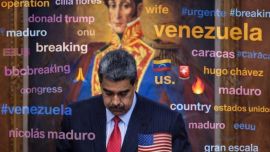Once more. Just as in May 2019 – when she announced that she would not top the presidential ticket that would compete with Mauricio Macri but instead stand with Alberto Fernández as his vice-presidential candidate – Cristina Fernández de Kirchner has shaken the political status quo, announcing that in the 2023 elections she will not be a candidate for any elected office.
Even for those who had ruled out the chance of her being a presidential candidate in 2023 (because all the polls indicated that she would be defeated), and even among those who even thought it was obvious that she would never be a presidential candidate (because if she could not be one in 2019 and had to appeal to Alberto Fernández, she could not run in 2023), when her own relationship with the electorate and that of the whole space she represents is worse than it was four years ago, after the wear and tear of the government), they were still surprised that she did not keep the unknown unknown for at least five more months until the electoral calendar forced her to take a public decision.
With regard to the above analysis, it is worth clarifying first of all that polls have been getting it wrong all over the world and that, in the almost a year that remains until the elections, the preferences reflected in the polls today could change dramatically: in politics, a year can be a century. And no poll indicates that in 2023 Cristina Fernández de Kirchner could not be elected senator for Buenos Aires Province if she decided to be a candidate because, even if the Frente de Todos were to lose in the region, where Kirchnerism is at its greatest strength, she would still be elected by the force that came in second place.
The self-exclusion of the vice-president from any candidacy reorganises the entire political map, starting with the opposition, which doubts that Fernández de Kirchner's decision is unchangeable and is suspicious of clamorous operatives who could end up making her a candidate once again.
The first consequence is it all but rules out a presidential candidacy for Mauricio Macri, who shares high negative rates in the polls along with Fernández de Kirchner, which could cancel each other out in an eventual ballot between the two. Logic: if she were not a candidate, Macri could not be one either.
In the same vein, another hypothesis is that within the internal disputes of the opposition Juntos por el Cambio coalition, Cristina's non-candidacy could favour the moderates and not the hawks, who capture Macri's vote, although it should be acknowledged that Patricia Bullrich has made efforts to appear autonomous from the former president and to develop her own characteristics.
Libertarian leader Javier Milei subscribes to a similar analysis but includes the whole of Juntos por el Cambio, arguing that with the 'bogeyman' of Kirchnerism is dead, the opposition electorate will not be imprisoned by voting for Juntos por el Cambio to prevent Kirchnerism from winning, and that this would benefit his party Avanza Libertad and increase the chances he himself will be the one who makes it through to a second round.
Inside the ruling coalition, the interpretations are as varied as the heterogeneity of its components. First off, the Kirchnerites who attended an asado barbeque with Fernández de Kirchner in Ensenada on the same night that the vice-president announced her decision maintain that they will keep telling their leader to reverse her decision. They are optimistic that they will be able to persuade her. Diana Conti, who was one of the participants, told Radio Perfil that the vice-president was relaxed at the dinner, a very different mood to the one she was in during her livestreamed address. It was "as if she had taken a weight off her shoulders,” said Conti.
Anyone who re-watches the vice-president's message (as Jaime Duran Barba always recommends), turning down the sound and paying attention only to the visual language, perceives a totally disjointed Cristina in the last part of her speech, when she announced that she was renouncing any 2023 candidacy. Some interpret this as a sign that it was not a studied decision but the result of the emotion of the moment. This could coincide with Conti's reading of the former president’s mood at the barbecue in Ensenada.
For the moderate sectors of Frente de Todos, including Alberto Fernández, Cristina’s self-exclusion strengthens the president’s natural candidacy for re-election. But if this were not the case, there is no figure representing Fernández de Kirchner who is sufficiently well known to be a very competitive electoral force. Interior Minister Eduardo ‘Wado’ de Pedro is more known to students of politics than the general public and Axel Kicillof – who does have necessary levels of awareness – would prefer to compete to renew his term as governor of Buenos Aires Province, where without a run-off the chances of Frente de Todos doing well are greater.
Economy Minister Sergio Massa would be the ruling party's other alternative, but in any case, if Frente de Todos were to propose a moderate – a non-representative of Cristinismo (as Milei calls it) – Juntos por el Cambio would not be able to appeal on the basis of Cristina coming back and those competing for the presidency would have to talk more about the project they would carry forward: ideas, rather than the emotions of the extreme polarisation generated by la grieta, would become the battleground.
An open ending, with a Cristina Fernández de Kirchner who has once again pressed a button and reset the political map.




















Comments